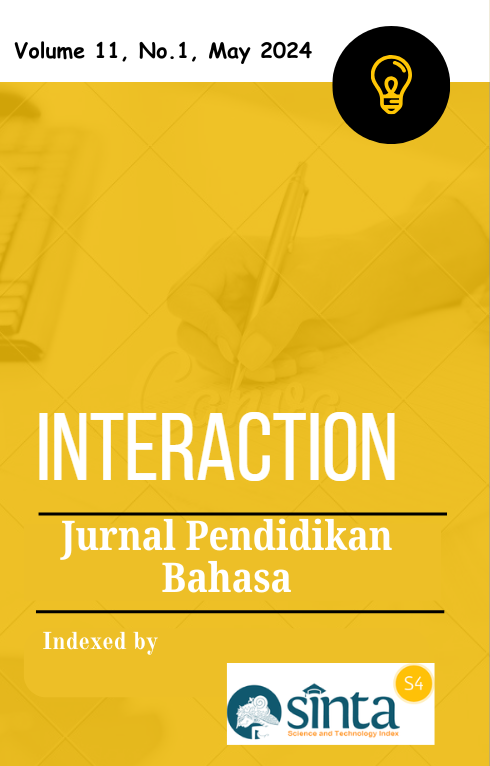Analysis of Students’ Difficulties in Writing Recount Text at WR. Supratman 2 School
Abstract
This study aims to identify and examine the challenges students face when composing recount texts, focusing on the experiences of grade XI MIPA 2 students at WR. Supratman 2 School. A qualitative research approach was utilized, collecting data through interviews and written tests to gain a comprehensive understanding of the difficulties encountered by students. The analysis of the data revealed that grammar was the most significant area of struggle for the students. Many students exhibited difficulties with the proper use of tenses, sentence structure, and vocabulary, which impacted their ability to write coherent and accurate recount texts. Based on these findings, the study recommends that teachers place greater emphasis on teaching grammar in a more structured and gradual manner, ensuring that students have ample time to grasp the concepts fully. Teachers should consider adopting a slower pace and using diverse instructional strategies, such as interactive exercises and practical applications, to reinforce grammar rules and facilitate better understanding. Additionally, the study suggests that students engage in daily English practice, including writing, reading, and listening activities, to enhance their language skills over time. Regular practice can help students become more familiar with the language, improve their grammatical accuracy, and increase their confidence in using English both in and out of the classroom. By addressing these challenges through targeted teaching strategies and consistent practice, both teachers and students can work together to improve the overall quality of students' writing and their ability to effectively compose recount texts. The findings of this study highlight the importance of a focused approach to grammar instruction and encourage a more supportive learning environment for students developing their English language skills.
Downloads
References
Choi, J., & Li, D. (2012). The use of computer-based writing feedback tools in EFL writing classrooms. ReCALL, 24(3), 308-324.
Creswell, J. W. (2016). Research design: Pendekatan metode kualitatif, kuantitatif dan campuran (Edisi Keempat, Cetakan Kesatu). Pustaka Pelajar.
Dörnyei, Z. (2014). Motivational strategies in the language classroom. Cambridge University Press.
Ellis, R. (2006). Current issues in the teaching of grammar: An SLA perspective. TESOL Quarterly, 40(1), 83-107.
Farrokhi, F., & Sattarpour, S. (2012). The effects of focused and unfocused written corrective feedback on grammatical accuracy of EFL learners. Theory and Practice in Language Studies, 2(7), 142-148.
Fraenkel, J. R., & Wallen, N. E. (2009). How to design and evaluate research in education (7th ed.). McGraw-Hill.
Harmer, J. (2004). How to teach writing. Pearson Education.
Hyland, K. (2013). Second language writing. Cambridge University Press.
Karani, E. (2008). Area of problems in writing recount text. Jurnal Pendidikan Inovatif, 4(1).
Karolina, A. (2020). Teaching English writing: An exploration of secondary teachers’ practices in an Indonesian setting. TESOL Journal, 11(2), 11-23. https://doi.org/10.1002/tesj.420
Krashen, S. D. (1982). Principles and practice in second language acquisition. Pergamon.
Kurotun, S. (2015). Improving students’ ability in writing descriptive text by using picture (Bachelor's thesis). Walisongo State Islamic University.
Linse, T. C. (2005). Practical English language teaching young learners. McGraw-Hill.
Littlewood, W. (2011). Communicative language teaching: An expanding concept for a changing world. In E. Hinkel (Ed.), Handbook of Research in Second Language Teaching and Learning (pp. 541-557). Routledge.
Manik, K. N., Sai Davis, Y. H., Nababan, I. A., Agus Salim Marpaung, Masitowarni Siregar, & T. Silvana Sinar. (2024). Higher education students’ translanguaging practices in North Sumatra: Case study of lecturer and student perceptions. International Journal of Humanities Education and Social Sciences, 3(4). https://doi.org/10.55227/ijhess.v3i4.823
Manik, K. N., Tarigan, M. S. B., & Sinaga, D. R. (2023). Deixis study in speech text of President Joko Widodo on Independence Day. Journal of Pragmatics Research, 5(2), 168–189. https://doi.org/10.18326/jopr.v5i2.168-189
Moleong, L. J. (2017). Metode penelitian kualitatif. PT Remaja Rosdakarya.
Nation, I. S. P. (2013). Learning vocabulary in another language (2nd ed.). Cambridge University Press.
Nunan, D. (2003). Practical English language teaching (1st ed.). Grow Hill Press.
Oktavia, Y., Wahyuni, E., & Rahmi, R. (2021). Students’ difficulties in writing English recount texts at the second year of SMAN 1 Kampar Timur. Journal of English Language Teaching, 10(2), 1-8.
Paltridge, B. (1996). Language learning classroom. 50(July), 237–243.
Putra, A. A., Nuraini, Y., & Wijayanti, D. (2023). The impact of genre-based approach on EFL students’ writing skills. Journal of Language and Linguistic Studies, 19(1), 45-59.
Putri, A., & Mahendra, R. (2021). Exploring EFL learners' writing anxiety in Indonesian secondary schools. Indonesian Journal of Applied Linguistics, 10(3), 658-666.
Rosyada, D. (2020). Penelitian kualitatif untuk ilmu pendidikan. Prenada Media.
Sari, S. R., Amalia, R. F., & Hakim, N. A. (2022). Analyzing students’ writing difficulties: The case of recount text in Indonesian high schools. English Language Teaching Educational Journal, 5(2), 14-28.
Schmitt, N. (2008). Review article: Instructed second language vocabulary learning. Language Teaching Research, 12(3), 329-363.
Shenton, A. K. (2004). Strategies for ensuring trustworthiness in qualitative research projects. Education for Information, 22(2), 63-75. https://doi.org/10.3233/EFI-2004-22201
Tessema, M. T. (2019). Writing challenges in higher education: Reflections on Ethiopian students’ academic writing skills. Journal of Language and Literature Studies, 6(1), 55-67.
Warschauer, M., & Grimes, D. (2007). Automated writing assessment in the classroom. Pedagogies: An International Journal, 2(1), 1-20.
Wijaya, A. K. (2014). The effect of using mind mapping on the writing comprehension ability of the tenth grade students at SMA Tiga Maret Yogyakarta in the academic year of 2014/2015 (S1 thesis). Yogyakarta State University.
Wisdhawan, D., & Kumalarini, T. (2014). Using diary to help students of eighth grade to write a recount text. RETAIN, 2(3), 4.




.png)



22.png)
